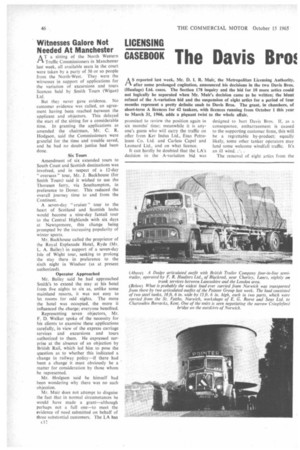Witnesses Galore Not LICENSING
Page 48

If you've noticed an error in this article please click here to report it so we can fix it.
Needed At Manchester
AT a sitting of the North Western Traffic Commissioners in Manchester last week, all available seats in the court were taken by a party of 50 or so people from the North-West. They were the witnesses in support of applications for the variation of excursions and tours licences held by Smith Tours (Wigan) Ltd.
But they never gave evidence. No customer evidence was called, an agreement having been reached between the applicant and objectors. This delayed the start of the sitting for a considerable time. In granting the applications as amended the chairman, Mr. C. R. Hodgson, said the Commissioners were grateful for the time and trouble saved, and he had no doubt justice had been done.
Six Tours Amendment of six extended tours to South Coast and Scottish destinations was involved, and in respect of a 12-day "overseas" tour, Mr. I. Backhouse (for Smith Tours) said it wished to use the Thoresen ferry, via Southampton, in preference to Dover. This reduced the overall journey time to and from the Continent.
A seven-day "cruiser " tour to the heart of Scotland and Scottish lochs would become a nine-day fantail tour to the Central Highlands with six days at Newtonmore, this change being prompted by the increasing popularity of winter sports, Mr. Backhouse called the proprietor of the Royal Esplanade Hotel, Ryde (Mr. L. A. Bailey) in support of a seven-day Isle of Wight tour, seeking to prolong the stay there in preference to the sixth night in Windsor (as at present authorized).
Operator Approached Mr. Bailey said he had approached Smith's to extend the stay at his hotel from five nights to six as, unlike some mainland resorts, it was not easy to let rooms for odd nights. The more the hotel was occupied, the more it influenced the charge; everyone benefited.
Representing seven objectors, Mr. F. D. Walker spoke of the necessity for his clients to examine these applications carefully, in view of the express carriage services and excursions and tours authorized to them. He expressed surprise at the absence of an objection by British Rail, which led him to pose the question as to whether this indicated a change in railway policy—if there had been a change it must obviously be a matter for consideration by those whom he represented.
Mr. Hodgson said he himself had been wondering why there was no such objection.
Mr. Muir does not attempt to disguise the fact that in normal circumstances he would have made a grant—although perhaps not a full one—to meet the evidence of need submitted on behalf of three substantial customers. The LA has c 1 7








































































































































